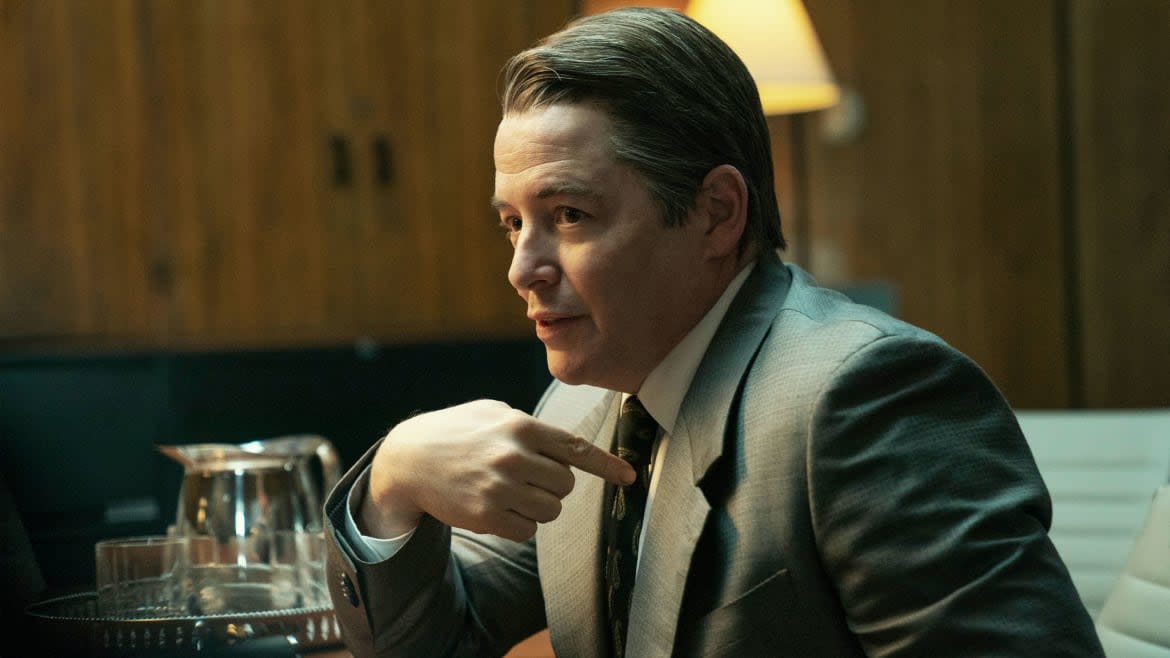Matthew Broderick’s New Drama Will Make You Seethe With Rage

Because every streaming platform apparently feels compelled to take Purdue Pharma to the woodshed for its prime role in creating the American opioid epidemic, Netflix follows Hulu (Dopesick) and HBO (The Crime of the Century) with Painkiller, a drama about the nefariousness of the pharmaceutical company and its owners, the Sacklers.
Channeling the rapid-fire energy of The Big Short, minus all the cutesy fourth wall-breaking, this six-part dramatic series from showrunners Micah Fitzerman-Blue and Noah Harpster, executive producer Alex Gibney, and director Peter Berg is a propulsive and compulsively watchable evisceration of the company that created a nationwide crisis. Its vehement rage at the Sacklers knows no bounds and is only matched by its empathy for those reduced to collateral damage by the family’s quest for wealth and power.
Based on Barry Meier’s book Pain Killer, as well as Patrick Radden Keefe’s New Yorker article “The Family That Built an Empire of Pain,” Painkiller (Aug. 10) frames its multi-pronged story through the questioning of Edie (an intense Uzo Aduba). An investigator with the U.S. Attorney’s office in Roanoke, Virginia, Edie agrees to recount her past inquiry into Purdue Pharma to federal lawyers once she realizes that the firm’s president, Richard Sackler (Matthew Broderick), has finally been deposed.
Guided by her livid commentary, the series initially flashes back to 1998, with Edie looking into a doctor who’s falsifying X-ray billing records. During the course of that work, she accidentally learns about OxyContin, an unassuming little blue pill that’s quietly become a phenomenon. It’s also covertly turned into a burgeoning problem, as Edie witnesses at a local pharmacy where an addict causes a violent scene in an attempt to procure the drug. Stunned, Edie pries further, discovering that OxyContin is being prescribed nonstop, sometimes in startling dosages, thanks to a corporate strategy involving young, sexy female sales reps pushing the pills to any and every seducible doctor around.

Two of those women, greedy veteran Britt (Dina Shihabi) and her eager protégée Shannon (West Duchovny), are a vital component of Painkiller, with their tale illustrating the means by which Purdue Pharma enticed college kids to throw away their ethics (if they had any) in pursuit of profit, using bribes of both a sexual and materialistic nature to convince physicians to rampantly peddle OxyContin. At the same time, the series focuses on the Sacklers, a billionaire clan that was turned into an economic and cultural juggernaut courtesy of Arthur (Clark Gregg), who believed that nothing was more important than his name and legacy, hence his donations to countless museums and hospitals. When Arthur passed away, his nephew Richard was the one who had the foresight to see that Purdue Pharma was key to saving the family fortune, and his “big idea” was to concentrate on pain by creating a medicine that would provide relief to millions and earn himself and his relatives untold additional billions.

Thus, OxyContin was born—a wonder drug that was more or less heroin in prescription pill form. Purdue deceptively marketed it to the hilt as a harmless cure-all, and in Painkiller Britt and Shannon sell its most potent variations with gusto, given that their bonuses are tied not to volume but to dosage levels (which went up to 160mg, mordantly known as “Oxy Coffins”). Berg directs all six installments of the show with a heady thrust that’s both an echo and sly critique of Purdue’s avarice, from Richard and his boardroom minions to Britt, Shannon, and their quasi-prostitute salesforce cohorts. In the process, he transforms what might have been a dry recent-events recap into a blistering portrait of gluttony in all its immoral forms.
Painkiller dispenses information at a ferocious pace, from the ugly motives and methods of sales creeps like Britt and Shannon, to Edie’s efforts to grasp the scale of Purdue’s villainy and also to find a prosecutable crime to hold them accountable. Then there’s Richard’s banality-of-evil coldness and covetousness, not to mention his willful blindness to the whirlwind he was reaping (here symbolized by a constant, pesky home smoke alarm). At the same time, it puts a human face on the epidemic via Glen Kryger (Taylor Kitsch), a mechanic who suffers a back injury and is prescribed OxyContin by his physician. Glen swiftly becomes an addict, destroying not only himself but his family, whose struggles to cope with this nightmare feel borderline clichéd precisely because they’re so widespread and familiar. Working with his Friday Night Lights and Battleship star, Berg gets a sturdy performance from Kitsch that evokes the desperation that drove so many to OxyContin, as well as the narcotics hunger that ultimately consumed them.

There’s little in Painkiller that hasn’t been covered in prior Purdue takedowns, including pill mill operations and FDA malfeasance (and the corrupt regulatory agency-to-business pipeline). Yet its compact storytelling—also marked by montages that draw fleet, sharp parallels, and a subplot about Edie’s estranged relationship with her incarcerated drug-dealer brother—allows it to make a case that’s easily digestible and comprehensively damning. Broderick is particularly good as Sackler, whom he embodies as a wickedly ambitious weirdo determined to win at all costs. The series shrewdly has Richard engage in regular conversation with the ghost of Arthur, the de facto family-legacy voice inside his head, congratulating him on his triumphs and cautioning him against destroying everything he was tasked with preserving. Berg, Fitzerman-Blue, and Harpster condense many true elements for dramatic-efficiency purposes, but the show’s narrative shortcuts never feel cheap; on the contrary, they allow the proceedings to capture the depth and breadth of Purdue’s malevolence.
If portions of Painkiller are technically made up, its depiction of the Sacklers nonetheless rings true. So too does its righteous anger, which comes across most movingly at the outset of each episode, when actual mothers and fathers read a standard fiction-versus-reality disclaimer before briefly discussing their sons and daughters, all of whom died due to OxyContin. These unvarnished documentary passages last less than a minute and yet are so powerful that their sorrow and rage hovers over the action, casting it as a heartfelt censure of a calamity brought about by an insatiable desire for more (damn the consequences!), and which ruined the lives of hundreds of thousands of Americans. First eliciting tears and then stoking outrage, Painkiller successfully does the opposite of its title.
Get the Daily Beast's biggest scoops and scandals delivered right to your inbox. Sign up now.
Stay informed and gain unlimited access to the Daily Beast's unmatched reporting. Subscribe now.

